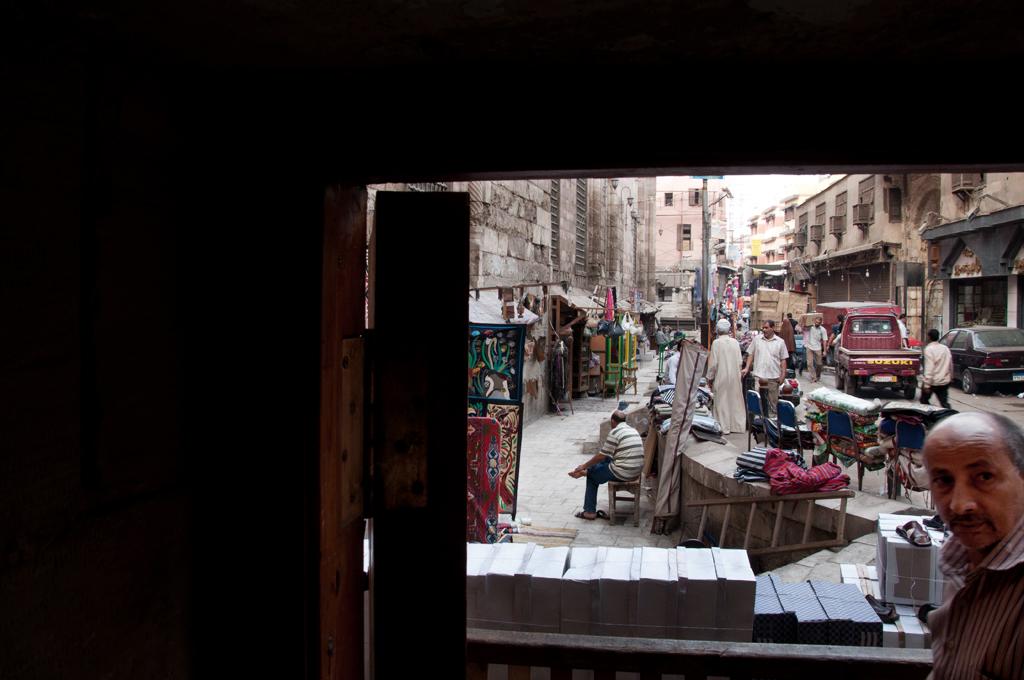Dusty desperation in old Cairo
Lightly trafficked stands line the narrow streets of Islamic Cairo in October 2011. Tourism is down 25 percent this year and some vendors are losing hope.
Selma Mohammed turned up the volume on her radio, a vintage hand-me-down from her uncle, shutting out Cairo’s Friday afternoon din. The achy lyrics of iconic Egyptian singer Abdel Halim Hafez blared from her kiosk, perched atop a meandering artery leading into the heart of Cairo’s famous bazaar, Khan El-Khalili. A pastiche of lollipops, Kool-Aid, and plastic children’s toys imported from China lay jumbled before her.
“Habibti (‘Sweetie’ in Arabic), are you here to write about our country?” she queried, resting her arms on an electric pink pillow on her lap. “We’re suffering. There’s nothing else to say.”
The famed market in the Islamic district of Cairo is one of the city’s main tourist attractions, though today it looks more like a deserted Hollywood movie set from days gone by. Egypt's once-booming tourism industry has now slowly started to rebound after the uprisings in January nearly paralyzed it, but the tourism minister predicted last month that the number of visitors this year will be down 25 percent from last year.
Halfway through the dusty, shop-lined labyrinth — an orientalist’s aesthetic paradise — Hisham Asmed, 69, sat with his friend.
“Ah, journalist!” he snapped, jokingly pre-empting my questions, “No political talk.” But you’re never too far from politics these days in Cairo. Faded graffiti on chipped edifices compete for space with fresh, sunny campaign posters for the Muslim Brotherhood’s Freedom and Justice party. The messages are short and simple: “Our life is better with the Freedom and Justice party“; “Healthcare is better with the F&J Party” “Transportation is better with the F&J party.”
“Do you know them?” Hisham asked me, the wrinkles in his forehead deepening. I nodded.
“Good,” he beamed. “Because they are excellent. They are the only people who work for things Egyptians want and need.”
Near Bab Zuweila, one of Cairo's medieval gates, Magdy and Asma sat in the front of a deserted shop, sharing a slow breakfast of falafel and bread. The couple, married for fifty years, waxed poetic about the years under Mubarak, ones they say promised “security” and “safety.” A group of young men in a butcher shop next door echoed their nostalgia.
“At least we knew who the devil was,” said Mostafa, 18. He said he participated in the “events” – 18 heated days in Tahrir Square, but has since turned all his efforts to working.
“Now, everyone is in the dark,” he said, slicing a slab of meat. He shrugged his shoulders when I asked him about a nearby demonstration where activists denounced the violence used by the military to break up last Sunday's peaceful Coptic march. “Every Friday, protests here, there. We are all blind men, talking, walking in the dark.”
Just a few meters from the side street, Khan El-Khalili stood like a postcard of Egypt’s economic woes: frantic vendors offer plastic pyramids for 5 USD, quickly slashing the price to $1 in a desperate blink of an eye; young boys run up to small flashes of tourists, hoping to sell them packs of tissues.
Hunched over, 68-year-old Mohammed shuffled through a crowd of 15 or so Americans whose cameras easily gave them away.
“I feel the suffering of our country every day. No tourists, no nothing,” he screamed in an urgent litany. “Just please tell everyone how beautiful Egypt is.”
Sweat dripped from his eyebrows as he addressed the largely non-Arabic speaking crowd. He looked them intensely in the eyes, demanding they pay attention.
He knew they didn’t understand a word. It didn’t matter. He just wanted to be heard.
We want to hear your feedback so we can keep improving our website, theworld.org. Please fill out this quick survey and let us know your thoughts (your answers will be anonymous). Thanks for your time!
